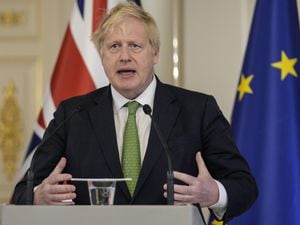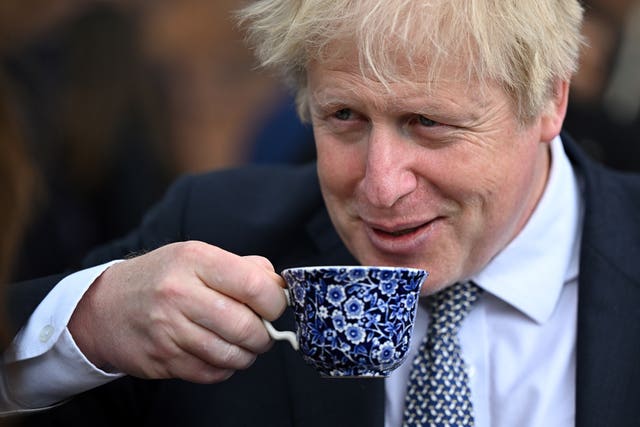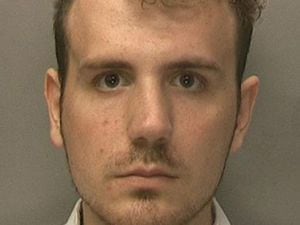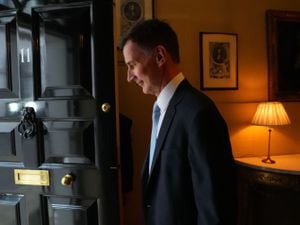PM says protocol causing ‘real problems’ in Northern Ireland and must be ‘fixed’
Boris Johnson said the DUP would not join a powersharing agreement until changes have been made to the Brexit treaty.

The Northern Ireland Protocol has become a “real problem” and must be “fixed” to ensure the country can agree a new powersharing administration, the Prime Minister has said.
The UK and the European Union have come to fresh blows over the Brexit treaty after reports emerged that the Foreign Secretary is drawing up emergency legislation to suspend elements of the protocol.
Boris Johnson, who negotiated the protocol when taking Britain out of the EU, would not be drawn on whether the wording of the divorce pact needed to be changed when questioned on Thursday.
He argued that without changes to the treaty, which is designed to prevent a hard border in Ireland, a new executive in Northern Ireland could not be formed as per the rules set out in the 1998 peace agreement.
Sinn Fein, which supports the protocol, made history during last week’s Stormont elections when it became the largest party in the Assembly for the first time.
But the Democratic Unionist Party (DUP) has ruled out entering into a new powersharing administration without significant changes to the protocol which governs post-Brexit trading arrangements.
The impasse has led to concerns in Westminster that the protocol could spark sectarian violence in a region still scarred by the Troubles.
The Prime Minister told broadcasters that the “institutions set up under the Good Friday Agreement aren’t functioning” and that political governance in Northern Ireland has “collapsed”.
Speaking in Stoke-on-Trent, he said: “The people of Northern Ireland need leadership, they need a regional, a provincial government… they haven’t got that.
“That’s a real, real problem.

“And the reason they don’t have that is because there’s one community in Northern Ireland that won’t accept the way the protocol works at present – we’ve got to fix that.”
The latest row came as months of tensions over the working of the protocol – which forms part of the UK’s Withdrawal Agreement with the EU – threatened to boil over.
Under its terms, the UK is required to impose checks on some goods crossing from Great Britain to Northern Ireland in order to maintain an open border with the Republic while protecting the EU single market.
However the Government has complained that the way it is being implemented is imposing a huge burden on businesses in Northern Ireland and creating trade barriers within the Union.
Ministers have repeatedly warned that they could unilaterally suspend the arrangements unless the EU agrees to major changes to reduce the impact.
But Brussels has raised the possibility of suspending the entire Brexit deal if the threat is carried out, in a move that would spark an all-out trade war and potentially exacerbate the cost-of-living crisis.
Foreign Secretary Liz Truss used a phone call with European Commission vice-president Maros Sefcovic on Thursday to warn that if the bloc does not show “flexibility” over the trading arrangements, then the UK would have “no choice but to act” alone, the Foreign Office said.
Cabinet Office minister Michael Ellis later drove that message home during a visit to Brussels, giving a speech in which he pressed for “significant changes”.
He said the EU’s approach in refusing to change the negotiation mandate had been “hugely disappointing”.
“We will continue to talk with the EU but we won’t let that stand in the way of protecting peace and political stability in Northern Ireland,” Mr Ellis told a press conference at the European Parliament.
“As both the Prime Minister and Foreign Secretary have made clear, we will take action to protect the Belfast (Good Friday) Agreement if solutions cannot be found.”
DUP leader Sir Jeffrey Donaldson, speaking to reporters in Antrim, said Government figures had told him to expect “movement” on the protocol “fairly soon”.
According to The Times, Attorney General Suella Braverman has issued legal advice that the UK could act because the EU’s implementation of the agreement was “disproportionate and unreasonable”.

Ministers have said they could trigger Article 16 of the protocol – the power allowing either side to suspend some of the arrangements – while reports have suggested Ms Truss is readying a domestic law designed to suspend parts of the terms.
Mr Sefcovic warned his counterparts in London that the EU could not “renegotiate” a form of Brexit that Britain freely signed up to.
Speaking in Brussels, the senior bloc figure said: “The EU cannot solve all the problems created by Brexit and the type of Brexit that the UK chose.
“That is the reason why the EU’s position has been consistent: we will not renegotiate the protocol, and the EU is united in this position.
“Unilateral action, effectively disapplying the protocol, is not a solution for the way forward.”
He said the commission “stands ready” to carry on working for a joint solution to the frictions being caused by the accord, and urged the UK “to do the same”.
The Irish Minister for European Affairs said on Thursday evening the suggestion that EU inflexibility on the protocol is fuelling unrest in the region is “completely, completely and utterly incorrect”.
Thomas Byrne told RTE radio he was confident the UK would pull back from threats to scrap parts of the post-Brexit arrangements.
Unilateral action by the UK also risks provoking a row with the US, where President Joe Biden has made clear his concern over any measure that could undermine the Good Friday peace agreement.





